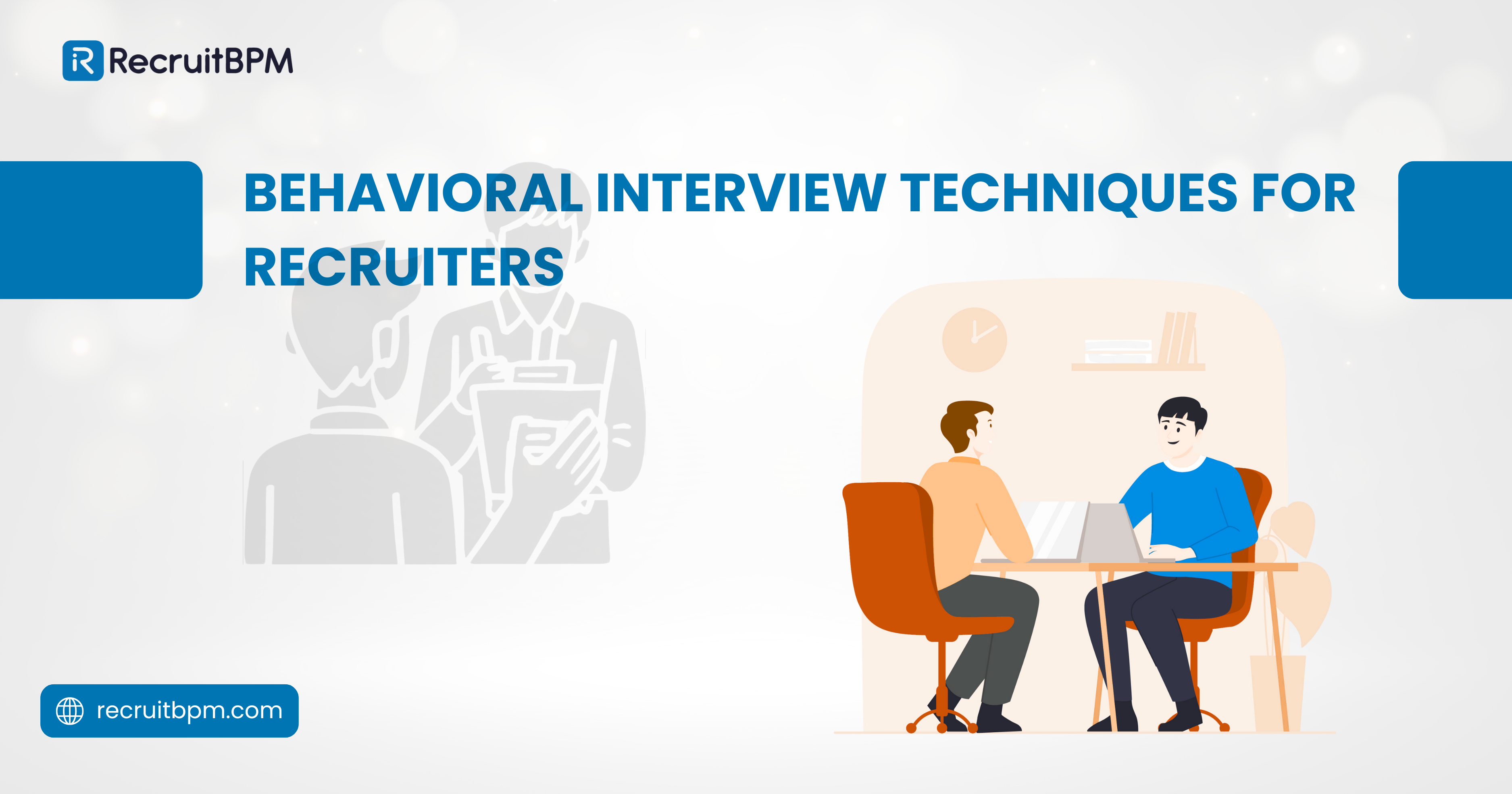Traditional interview questions asking how candidates would handle hypothetical situations invite rehearsed, theoretical responses disconnected from reality. Candidates describe ideal behaviors rather than demonstrating actual capabilities through proven experience.
Behavioral interviewing revolutionizes candidate assessment by focusing on past performance as the most reliable predictor of future success. This evidence-based approach reveals how candidates actually responded to challenges, not how they imagine they might respond. For recruitment agencies, mastering behavioral interview techniques dramatically improves placement quality while building client confidence in candidate recommendations.
What is a Behavioral Interview?
A behavioral interview is a structured interview technique that asks candidates to provide specific examples of how they handled situations in previous roles, based on the principle that past behavior predicts future performance. In behavioral interviews, candidates are asked to give specific examples of when they demonstrated particular behaviors or skills.
During a job interview, employers may ask behavioral interview questions to assess how well you handled specific situations in the past and determine your likely behavior in similar situations. Rather than simply asking transparent questions about what candidates did in their jobs, behavioral interviewers ask candidates how and why they did it.
Behavioral interview questions typically begin with phrases like “Tell me about a time when…” or “Describe a situation where…” or “Give me an example of…” These prompts require candidates to recall actual experiences rather than construct hypothetical scenarios.
The methodology evaluates competencies including problem-solving abilities, leadership skills, teamwork and collaboration, conflict resolution, adaptability and resilience, communication effectiveness, time management, and decision-making under pressure. Each question targets specific behaviors relevant to job requirements.
Candidates typically structure responses using frameworks like STAR (Situation, Task, Action, Result) or SOAR (Situation, Obstacle, Action, Result) that provide clear narrative arcs demonstrating capabilities through concrete examples. These structured approaches ensure comprehensive answers covering context, challenges, actions taken, and measurable outcomes.
Why Behavioral Interview Matters for Recruitment Agencies?
The recruitment industry increasingly recognizes behavioral interviewing as an essential methodology for improving placement quality and reducing costly hiring mistakes. The data validates this shift decisively.
Industry adoption validates effectiveness. Recruiters and hiring managers believe behavioral interviewing techniques are beneficial, with 86% of respondents to a LinkedIn survey rating the method as “somewhat or very effective.” This near-consensus demonstrates that behavioral interviews have moved from experimental to mainstream assessment methodology.
Usage rates reflect widespread implementation. Behavioral interviews, focusing on past behaviors to predict future performance, are used in 73% of cases. This high adoption rate creates standardized expectations—candidates prepare for behavioral questions, and clients expect recruitment agencies to employ these techniques during screening.
Soft skills assessment drives adoption. Past behavior questions help leaders assess soft skills, which have grown in importance by 10% since 2018. Technical capabilities alone don’t predict success; interpersonal skills, emotional intelligence, and cultural fit matter equally. Behavioral interviews excel at evaluating these intangible qualities that resume review and technical assessments miss.
Predictive accuracy exceeds traditional methods. By using behavior-based interview questions, you will hear real-world examples of skills and abilities. Instead of using hypothetical questions to assess the candidate, they provide examples from previous job experiences that showcase their ability to meet the demands of the position. This evidence-based approach reduces the gap between interview impressions and actual job performance.
Cultural fit assessment improves significantly. Behavioral interviews assess qualities that case interviews cannot, such as cultural fit, communication skills, and the ability to turn experiences into compelling, meaningful stories. Organizations increasingly recognize that skills can be taught, but cultural alignment and communication style are more intrinsic.
Placement success rates increase measurably. Recruitment agencies employing structured behavioral interviews report higher placement retention rates and client satisfaction scores. Candidates accurately evaluated through behavioral methods perform closer to expectations, reducing the failures that damage agency reputations.
Client confidence grows through methodology transparency. Explaining that your screening process includes behavioral interviews demonstrates systematic rigor. Clients appreciate knowing that candidate recommendations stem from evidence-based assessment rather than subjective impressions formed during casual conversations.
Competitive differentiation emerges through expertise. Recruitment agencies mastering behavioral interview techniques can articulate specific competency evidence supporting each candidate recommendation. This detailed justification separates professional agencies from those providing superficial candidate summaries based on resume keywords.
How to Use Behavioral Interview Effectively?
Implementing behavioral interviews successfully requires preparation, structured questioning, active listening, and systematic evaluation that transforms conversations into predictive assessments.
Define competencies before interviewing begins. Identify which behaviors predict success in specific roles. Sales positions require different competencies than engineering roles. Create competency matrices mapping essential behaviors to job requirements. This preparation ensures interview questions target relevant capabilities rather than exploring interesting but irrelevant experiences.
Develop question banks organized by competency. Build libraries of behavioral questions organized by skill category—leadership, problem-solving, teamwork, conflict resolution, adaptability, communication, time management, and initiative. Having pre-written questions ensures consistency across candidates and prevents improvised questions that lack strategic purpose.
Use consistent question sets for comparable evaluation. Ask all candidates for the same position identical core behavioral questions. This standardization enables fair comparisons and reduces bias. Supplemental questions can explore individual backgrounds, but the core competency assessment should use consistent prompts.
Master follow-up questioning techniques. Initial behavioral responses often provide incomplete information. Develop probing skills that dig deeper without leading candidates toward desired answers. Questions like “What specifically did you do?” or “How did others react?” or “What would you do differently?” reveal depth beyond prepared stories.
Listen for STAR/SOAR structure completeness. Evaluate whether candidates provide complete narratives including situation context, specific tasks or obstacles faced, actions taken personally (not team achievements), and measurable results. Incomplete responses may indicate embellished or borrowed experiences.
Distinguish personal actions from team accomplishments. Candidates often describe team successes using “we” language without clarifying their individual contributions. Probe to understand exactly what the candidate personally did versus what others contributed. This distinction reveals whether they truly demonstrated the competency or merely participated peripherally.
Take detailed notes during interviews. Document specific examples, actions described, and results claimed. These notes enable accurate post-interview evaluation and provide evidence justifying candidate recommendations to clients. Memory alone cannot retain sufficient detail across multiple candidates.
Evaluate response authenticity carefully. Practiced candidates sometimes provide polished but generic behavioral responses that could apply to anyone. Authentic experiences include specific details, emotional reactions, and lessons learned. Overly smooth, perfectly structured responses may warrant deeper probing.
Assess self-awareness through reflection questions. Strong behavioral responses include honest assessment of what went well, what didn’t, and what the candidate learned. Self-aware candidates demonstrate a growth mindset and capacity for improvement—valuable qualities in any role.
Combine behavioral interviews with other assessments. Behavioral interviews evaluate how candidates handled past situations but don’t test current skill levels or cognitive abilities. Integrate behavioral techniques within comprehensive evaluation frameworks, including skills assessments, aptitude testing, and reference checks for complete candidate understanding.
Train interviewers systematically. Behavioral interviewing requires different skills than traditional conversation-based interviews. Provide training on competency identification, question construction, active listening, probing techniques, and bias recognition. Consistent quality across your team maintains assessment standards.
Score responses using structured rubrics. Create evaluation frameworks that rate behavioral responses on dimensions like relevance, complexity, personal ownership, outcome impact, and learning demonstrated. Structured scoring reduces subjective judgment and enables quantitative candidate comparisons.
Common Challenges with Behavioral Interview
Despite significant benefits, behavioral interviewing introduces distinct challenges that recruitment agencies must navigate to maintain assessment quality and candidate experience.
Candidates prepare extensively for common questions. Behavioral interview questions have become so standard that candidates rehearse polished responses to predictable prompts. These practiced stories may not reflect typical behavior patterns, creating false impressions of capability. Overcoming this requires varied question approaches and deep probing beyond surface responses.
Response authenticity becomes difficult to verify. Candidates can fabricate or embellish behavioral examples knowing that interviewers rarely verify specific stories with previous employers. Distinguishing genuine experiences from exaggerated or fictional accounts challenges even experienced interviewers. Reference checks become essential validation mechanisms.
Time constraints limit question depth. Thorough behavioral interviews require significant time—each question with proper follow-up consumes 10-15 minutes. Limited interview windows force trade-offs between competency coverage breadth and individual question depth. Prioritizing which competencies matter most becomes critical.
Past behavior may not predict future performance in different contexts. Behavioral interviewing assumes consistency across environments, but organizational culture, resources, team dynamics, and leadership significantly influence behavior. Success in one company doesn’t guarantee similar success elsewhere when contextual factors differ substantially.
Candidates without traditional experience struggle unfairly. Career changers, recent graduates, and those with non-linear paths may lack specific experiences that behavioral questions request. These candidates possess relevant capabilities demonstrated in different contexts, but traditional behavioral frameworks disadvantage them. Flexible question framing becomes necessary.
Interviewer bias persists despite structure. Behavioral interviews reduce but don’t eliminate bias. Interviewers may unconsciously favor candidates whose communication styles, backgrounds, or experiences mirror their own. Stories from certain industries or companies may receive unwarranted credibility. Recognizing these biases requires constant vigilance.
Negative experience questions create discomfort. Asking about failures, conflicts, or mistakes—essential for complete assessment—makes some candidates uncomfortable. How interviewers frame these questions and respond to honest vulnerability significantly impacts both assessment quality and candidate experience.
Cultural differences affect storytelling styles. Behavioral interviewing originated in Western business contexts, emphasizing individual achievement. Candidates from collectivist cultures may struggle with questions demanding personal credit separated from team accomplishments. Their communal framing reflects cultural values, not capability limitations.
Remote interviewing complicates behavioral assessment. Video interviews eliminate in-person cues that help evaluate response authenticity. Technical issues, awkward delays, and screen fatigue reduce interview effectiveness. Adapting behavioral techniques for virtual environments requires specific adjustments.
Question construction requires ongoing refinement. Generic behavioral questions like “Tell me about a time you showed leadership” invite prepared responses. Developing specific, role-relevant questions that elicit unique stories demands continuous improvement based on which questions actually predict successful placements.
Scoring subjectivity undermines consistency. Even with rubrics, evaluating behavioral responses involves judgment. One interviewer’s “excellent problem-solving example” may be another’s “adequate but unimpressive response.” Calibration sessions where interviewers jointly evaluate recorded responses can improve consistency.Candidates may lack recent relevant examples. Professionals in stable long-term roles may struggle recalling specific situations from years past. Their current competency levels may exceed what distant examples demonstrate. Balancing recency with relevance challenges both interviewers and candidates.

















